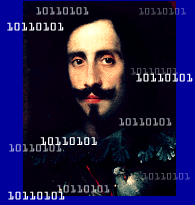| "...their finest pictures were
wrestled from their rightful names generations ago, certified by some expert, and then
sold to a wealthy collector as a Van Dyck" |
The Van Dyck Research Committee is sponsored by Veritus, but
operates and publishes its findings with autonomy. The committee is dedicated to the
discovery of the true identity of the artists who were the creators of the paintings now
attributed to Sir Anthony Van Dyck. To this end, the Van Dyck Research Committee uses the
latest in twenty-first century technology and forensic investigative methods. Through the
use of modern technology, the Committee is able solve mysteries and to discover centuries old misattributions. Complete Catalogue Raisonnés in both traditional print media
and DVD's will be made available in the future.
The fundamental problem addressed by this Committee is the authorship of
paintings attributed to the hand of Sir Anthony Van Dyck. Unfortunately, the actual
authorship of these paintings was lost in a veritable blizzard of attributions to Van
Dyck. In all fairness, Van Dyck has not been alone in this snowstorm of misattribution.
Rembrandt van Rijn, Sir Peter Paul Rubens and Francisco de Goya share the same fate. The
Rembrandt Research Committee has recently completed its catalogue, and the results may be
viewed at the Rembrandt Committee
site.
It was apparent from the beginning of this study that the number of
paintings attributed to Van Dyck is not logically possible. This observation is easy to
confirm. One only needs to examine the body of works from other successful but less
monetarily valuable artists of the same period. The bodies of works attributed to these
artists rarely reaches one hundred pictures. More often, the number is much less than
fifty. Many students of Van Dyck painted for more than thirty years; yet, they have less
than ten pictures attributed to their names. This lack of paintings attributable to the
followers of Van Dyck is founded in simple truth. Few paintings remain to their credit
because most of their finest pictures were wrestled from their rightful names generations
ago, certified by some "expert," and then sold to a wealthy collector as a Van
Dyck.
Sadly, these incorrect attributions are a great disservice to everyone. It
is not fair to Van Dyck to hold him responsible for the paintings of his followers,
whether the paintings be good, bad or indifferent. Such attributions take away from the
genius of Van Dyck. Concurrently, it is not fair to his pupils and followers to have their
very best works taken away and attributed to Van Dyck.
It was obvious to the Committee that a new method and philosophy for
examining authorship was necessary. The Committee was determined not to repeat the errors
of those that came before us. It was crucial to develop a new method for attribution based
on twenty-first century technology. It was imperative that attribution should not be dependent upon
subjective opinions or dubious circumstantial evidence.
Research is presently being conducted into the paintings of Van Dyck. There
is much work yet to be done before we are prepared to release our findings to the public.
However, our examination to date has shown that approximately ninety percent of the
paintings published as works of Van Dyck are by the hands of other artists. The complete
Catalogue Raisonné for Van Dyck should be online in 1999.
The Van Dyck Research Committee extends its gratitude to both Veritus and
its sponsors for their kind assistance in this project. The costs of research, computer
time, technology applications and publishing of this site have been made possible by a
grant from Veritus.
|

